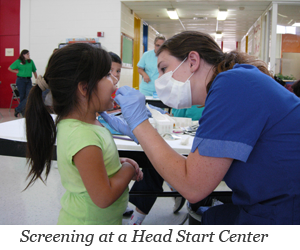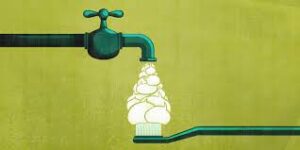
As you know, the American Dental Association recommends that you visit your dentist at least every six months. That’s because regular dental visits are needed for maintaining healthy teeth and gums. These visits help to protect not just your oral health, but also your overall health. In between those dental examinations, there are specific things that will help you to keep your teeth and gums healthy:
1. Brush your teeth twice daily with fluoride tooth paste.
2. Regularly floss or clean in-between your teeth.
3. On the occasion that you are unable to brush, thoroughly rinse your mouth with water, then brush when possible.
4. Minimize your intake of sugary foods, desserts and sticky snacks, and best to limit them to meal times.
5. Have a dental screening through Pima County Health Department’s First Smiles Matter program (or a similar First
Things First (FTF) program offered through a community health program near you).
Many people don’t realize that we offer dental screenings, [or sometimes called, oral health screenings], a fast and easy process, offered at no cost to you. These screenings do not replace dental visits, but offer reassurance that you are on the right track. All that is needed for the screening is a small dental mirror and flashlight so that the dental hygienist can:
• Look at your teeth and gums
• Check that you are free of cavities/tooth decay
• Note and advise on any issues that need to be addressed by your dentist
• Show you healthy areas or areas that need a little more attention
• Offer free fluoride treatments for children, as needed
• Provide a referral for dental care, as needed
• And give you a new toothbrush and other oral hygiene supplies
These noninvasive screenings are offered to any child, 0 to 5 years of age, and to expectant women in Pima County. We are here for you. Our screenings take place in childcare and preschool facilities, doctors’ offices, hospitals, WIC offices, health fairs, /community events and also in our office.
Though our work is not done, it is important to know is that through a statewide effort, fewer children have untreated tooth decay. “In recent years many different organizations in Arizona, including FTF and ADHS (Arizona Department of Health Services), have worked on improving access to dental care for children. The efforts are paying off – compared to 2003, significantly fewer children had untreated decay in 2015. Overall, 27% of Arizona’s kindergarten children were found to have untreated decay, a decrease from 35% in 2003.” [From – First Things First 2016 Children’s Oral Health Report]
For more information feel free to contact us by calling, First Smiles Matter (520) 724-7902. *** The above illustration photo was found on the internet.




